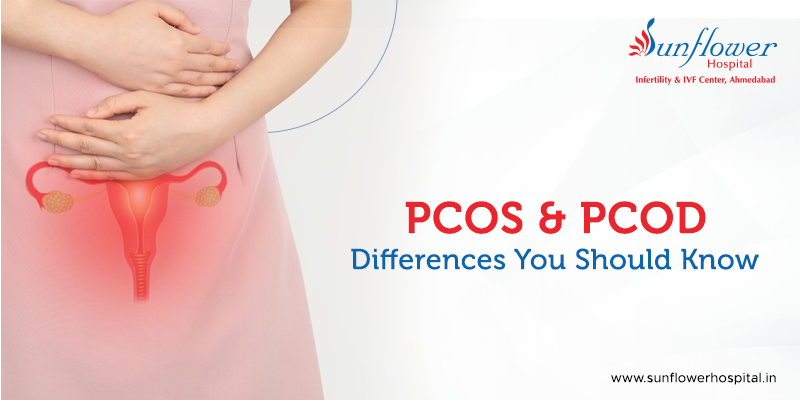Women often confuse polycystic ovary syndrome (PCOS) and polycystic ovarian disease (PCOD), the medical conditions that significantly affect their reproductive health. The two acronyms, PCOS and PCOD, might seem similar but represent different conditions. Let us learn about these two medical issues briefly.
What is PCOD?
Polycystic ovarian disease, commonly known as PCOD, is a condition affecting the normal functioning of the ovaries. Under this, female ovaries produce partially or completely mature eggs in quantities that become cysts with time. As a result, the ovaries become big and release male hormones in large amounts, which can lead to irregular periods, abnormal weight gain, infertility, and hair loss. It is possible to control this disease by implementing certain lifestyle and diet changes suggested by our best gynae in Ahmedabad.
What is PCOS?
PCOS, or polycystic ovary syndrome, is a condition affecting their hormonal levels. This metabolic disorder most commonly affects women between the ages of 12 to 51. Under this, the production of male hormones increases in the female’s body, which results in an irregular menstrual cycle, difficulty conceiving, and unusual hair growth on the face and body. In the long run, PCOS can lead to diabetes or heart conditions.
What are the Common Symptoms or Signs of PCOS and PCOD?
Both conditions often go unnoticed by women of all ages. However, some might experience symptoms from their first menstrual cycle, and some might discover the conditions only when they try to conceive. Some of the most common symptoms or signs of both the conditions are:
- Amenorrhea (Irregular or no menstruation)
- Oligomenorrhea (irregular menstruation)
- Menorrhagia (heavy bleeding during periods)
- Acne on the chest, upper back, or face
- Abnormal hair growth on the face and body, especially belly, chest, and back
- Abnormal weight gain
- Darkening of the skin under the breast, in the groin, or on the neck
- Excessive hair fall
Please note that even though both conditions share some common symptoms or signs, it does not mean they are the same. Therefore, it is important for you to know the basic difference between both. So, continue reading!
What is the Difference Between PCOS and PCOD?
| PCOS | PCOD |
| PCOS is a serious condition under which ovaries produce and release male hormones in large numbers which leads to excessive cyst formation. | Under PCOD, female ovaries produce partially or completely mature eggs in large quantities which further leads to the formation of cysts, |
| It is a more severe condition that affects very few women. | It is a common condition affecting almost one-third of women globally. |
| It can lead to high blood pressure, type 2 diabetes, heart condition, and advanced endometrial cancer. | It does not accompany serious complications. |
| It influences fertility in women which is why it can be difficult for them to conceive. Moreover, there is a high risk of premature birth, complications, or miscarriage. | It doesn’t affect fertility in females and they can conceive with the help of medications and lifestyle changes. |
PCOS and PCOD Treatment at Sunflower Infertility & IVF Center
If you experience any symptoms or have difficulty conceiving after trying for a while, we advise you to visit our best gynaecologist in Ahmedabad. We have several treatment options to help you conceive with minimum or no complications.
Also, for your appointment, make sure to be transparent about your past infertility treatment in India (if any), symptoms, family history, medical history, and reports (if any).


Leave a Comment